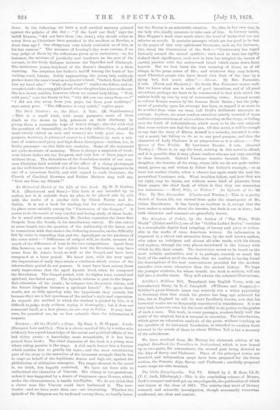NOVE Ls. — All the World's a Stage. By Mary A. M.
Hoppus. 3 vols. (Sampson Low and Co.)—This is a clover novel of life, by a writer who evidently has a good knowledge of the social and political affairs of the last thirty years,—a knowledge more remarkable, if it has been gained from books. The chief character of the book is a young man whose ruling passion is the stage. A rich uncle leaves him a fortune which enables him to gratify his taste ; and the most entertaining part of the story is the narrative of the incessant struggle that he has to wage on behalf of the legitimate drama and high art, against the philistinism of utilitarian managers. The tragic element in the novel is, we think, less happily contrived. We have not been able to understand the character of Vincent. His villany is too gratuitous, unless it was suggested by a desire of vengeance upon Horace, which, under the circumstances, is hardly intelligible. We do not think that a clever man like Vincent could have harboured it. The love- stories—and we have more than one—are interesting. Whether the episode of Dr. Simpson can be reckoned among them, we hardly know,
but the Doctor is an admirable creation. So, also, in her own way, ia the lady who kindly consents to take care of him. In literary merit,, Miss Hoppus's work rises much above the level of books that are not inferior as novels. It contains passages which are too good to be lost, in the pages of this very ephemeral literature, such as, for instance,
this, about the Communion of the Sick Controversy has raged furiously around the sacred symbols; each sect in turn has rigidly defined their significance, each sect in turn has mingled the leaven of earthly passion with the unleavened bread which came down from heaven. But we best learn the true moaning of those, as of all things, in the great crises of life ; and whatever they may believe, most Christian people who have drunk that fruit of the vine by a dying bed, feel much alike."—Rhona. By Mrs. Forrester. 3 vols. (Hurst and Blackett.)—No doubt Mrs. Forrester means well. But we know what use is made of good intentions, and of all good intentions, perhaps the least to be commended is that with which the satirist holds up vice by way of commanding virtue. Juvenal meant to reform Roman women by his famous Sixth Satire ; but the judg- ment of posterity upon his attempt has been, to regard it as more to be avoided than what we must call Ovid'e deliberate attempts to corrupt. Anyhow, we must confess ourselves utterly wearied of these endless representations of wives either standing on the verge, or fulling over the brink of unfaithfulness, which seem to be the only subjects that some writers can find for the pen. Of this novel, it will be enough to say that the story of Rhona herself is a mistake, intended to con. vey a moral, but failing to do so to any good purpose, and that the character of Lady Chaloner is as pimposeless as it is odious.---The Queen of Two Worlds. By Lawrence Brooke. 3 vols. (Samuel Tinsley.)—There is, to say the least, nothing in this novel to offend, and it is possible that it may please readers who are net very exacting in their demand. Gabriel Vanstone marries beneath him. His daughter, the heroine of the story, whose title we do not quite under. stand, grows up, and wishes to follow her father's example,—so at least her mother thinks, when a chance has again made the now im. poverished Vanstones rich. What troubles follow, and how they are set right, may be learnt, not without some kind of pleasure, from these pages, the chief fault of which is that they are somewhat too numerous.—Maid, Wife, or Widow ? An Episode of the '66 War. By Mrs. Alexander. (Ghetto and Windus.)—This is a pretty sketch of Saxon life, not viewed from quite the stand-point of Mr. Julian Hawthorne. It has barely an incident in it, except that the hero makes a mistake about the heroine, but finds it out in time; but both character and manners are gracefully drawn.


































 Previous page
Previous page